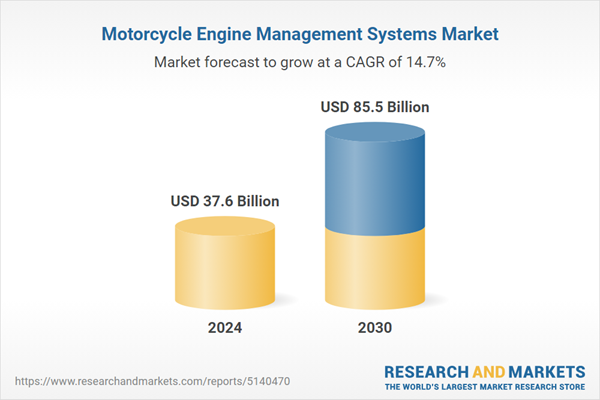Global Motorcycle Engine Management Systems Market - Key Trends & Drivers Summarized
What Are Motorcycle Engine Management Systems and Why Are They Fundamental?
Motorcycle engine management systems (EMS) are sophisticated electronic controllers that manage the engine's operation to optimize performance, efficiency, and emissions. These systems control various aspects of the engine's function, such as fuel injection, ignition timing, and air intake, using sensors that monitor engine performance and environmental conditions. By precisely adjusting these parameters, EMS ensures the engine runs at peak efficiency, complying with stringent emission regulations while providing a smooth riding experience. The system is crucial for meeting modern demands for fuel economy and reduced environmental impact, making it a standard feature in new motorcycles, especially those aiming to achieve high performance and compliance with global emissions standards.How Are Technological Advancements Shaping Motorcycle EMS?
Technological advancements are driving significant improvements in motorcycle engine management systems. Innovations include the integration of more precise sensors and faster microprocessors that enhance the system's ability to make real-time adjustments to engine settings. This capability allows for more refined tuning of engine parameters, resulting in better throttle response, increased fuel efficiency, and lower emissions. Additionally, the integration of connectivity features enables remote diagnostics and software updates, allowing for continual optimization of engine performance based on real-world data. These technological enhancements not only elevate the rider's experience but also contribute to the broader adoption of advanced EMS in motorcycles.What Market Trends Are Propelling the Adoption of Advanced Motorcycle EMS?
The market trends influencing the adoption of advanced motorcycle engine management systems include increasing environmental concerns and regulatory pressures to reduce emissions. As countries tighten their emissions standards, motorcycle manufacturers are compelled to adopt advanced EMS that can comply with these regulations while still delivering the power and performance riders expect. Moreover, the growing popularity of high-performance sports motorcycles, which require precise engine control for optimal performance, further drives the development and refinement of EMS. The demand for customization and adaptability in motorcycles also supports the trend toward more sophisticated systems that can be tuned to individual preferences and riding conditions.What Drives the Growth in the Motorcycle Engine Management Systems Market?
The growth in the motorcycle engine management systems market is driven by several factors. Regulatory requirements for lower emissions play a significant role, as do advancements in technology that allow manufacturers to integrate such systems cost-effectively. Increasing consumer demand for more efficient, high-performance motorcycles that also offer enhanced environmental friendliness boosts the adoption of sophisticated EMS. Additionally, the integration of electronic components in vehicles, part of the broader trend toward vehicle electrification and smart systems, encourages continuous innovation in engine management technologies. Together, these factors ensure a robust demand for advanced EMS, shaping the future of motorcycle technology.Report Scope
The report analyzes the Motorcycle Engine Management Systems market, presented in terms of market value (USD). The analysis covers the key segments and geographic regions outlined below.- Segments: End-Use (Commuter, Mid-Premium, Premium).
- Geographic Regions/Countries: World; United States; Canada; Japan; China; Europe (France; Germany; Italy; United Kingdom; and Rest of Europe); Asia-Pacific; Rest of World.
Key Insights:
- Market Growth: Understand the significant growth trajectory of the Commuter End-Use segment, which is expected to reach US$46.3 Billion by 2030 with a CAGR of 15.7%. The Mid-Premium End-Use segment is also set to grow at 14.4% CAGR over the analysis period.
- Regional Analysis: Gain insights into the U.S. market, valued at $10.5 Billion in 2024, and China, forecasted to grow at an impressive 14% CAGR to reach $13 Billion by 2030. Discover growth trends in other key regions, including Japan, Canada, Germany, and the Asia-Pacific.
Why You Should Buy This Report:
- Detailed Market Analysis: Access a thorough analysis of the Global Motorcycle Engine Management Systems Market, covering all major geographic regions and market segments.
- Competitive Insights: Get an overview of the competitive landscape, including the market presence of major players across different geographies.
- Future Trends and Drivers: Understand the key trends and drivers shaping the future of the Global Motorcycle Engine Management Systems Market.
- Actionable Insights: Benefit from actionable insights that can help you identify new revenue opportunities and make strategic business decisions.
Key Questions Answered:
- How is the Global Motorcycle Engine Management Systems Market expected to evolve by 2030?
- What are the main drivers and restraints affecting the market?
- Which market segments will grow the most over the forecast period?
- How will market shares for different regions and segments change by 2030?
- Who are the leading players in the market, and what are their prospects?
Report Features:
- Comprehensive Market Data: Independent analysis of annual sales and market forecasts in US$ Million from 2024 to 2030.
- In-Depth Regional Analysis: Detailed insights into key markets, including the U.S., China, Japan, Canada, Europe, Asia-Pacific, Latin America, Middle East, and Africa.
- Company Profiles: Coverage of players such as Bazzaz, Inc., BMW AG, Continental AG, Delphi Auto Parts, Denso Corporation and more.
- Complimentary Updates: Receive free report updates for one year to keep you informed of the latest market developments.
Some of the 13 companies featured in this Motorcycle Engine Management Systems market report include:
- Bazzaz, Inc.
- BMW AG
- Continental AG
- Delphi Auto Parts
- Denso Corporation
- Infineon Technologies AG
- Kawasaki Heavy Industries Ltd.
- Magneti Marelli SpA
- McLaren Applied Technologies
- Mitsubishi Electric Corporation
- Niki Auto Motor Ltd.
- NXP Semiconductors NV
- Omnitek Engineering, Corp.
- Robert Bosch GmbH
- Walbro LLC
This edition integrates the latest global trade and economic shifts into comprehensive market analysis. Key updates include:
- Tariff and Trade Impact: Insights into global tariff negotiations across 180+ countries, with analysis of supply chain turbulence, sourcing disruptions, and geographic realignment. Special focus on 2025 as a pivotal year for trade tensions, including updated perspectives on the Trump-era tariffs.
- Adjusted Forecasts and Analytics: Revised global and regional market forecasts through 2030, incorporating tariff effects, economic uncertainty, and structural changes in globalization. Includes historical analysis from 2015 to 2023.
- Strategic Market Dynamics: Evaluation of revised market prospects, regional outlooks, and key economic indicators such as population and urbanization trends.
- Innovation & Technology Trends: Latest developments in product and process innovation, emerging technologies, and key industry drivers shaping the competitive landscape.
- Competitive Intelligence: Updated global market share estimates for 2025, competitive positioning of major players (Strong/Active/Niche/Trivial), and refined focus on leading global brands and core players.
- Expert Insight & Commentary: Strategic analysis from economists, trade experts, and domain specialists to contextualize market shifts and identify emerging opportunities.
Table of Contents
Companies Mentioned (Partial List)
A selection of companies mentioned in this report includes, but is not limited to:
- Bazzaz, Inc.
- BMW AG
- Continental AG
- Delphi Auto Parts
- Denso Corporation
- Infineon Technologies AG
- Kawasaki Heavy Industries Ltd.
- Magneti Marelli SpA
- McLaren Applied Technologies
- Mitsubishi Electric Corporation
- Niki Auto Motor Ltd.
- NXP Semiconductors NV
- Omnitek Engineering, Corp.
- Robert Bosch GmbH
- Walbro LLC
Table Information
| Report Attribute | Details |
|---|---|
| No. of Pages | 232 |
| Published | January 2026 |
| Forecast Period | 2024 - 2030 |
| Estimated Market Value ( USD | $ 37.6 Billion |
| Forecasted Market Value ( USD | $ 85.5 Billion |
| Compound Annual Growth Rate | 14.7% |
| Regions Covered | Global |









